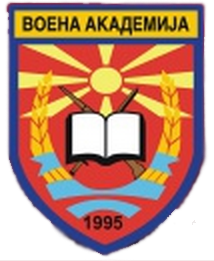Participants
- Faculty of Electrical Engineering – University of Ljubljana
- Military Academy “General Mihailo Apostolski” – Skopje, associate member of University “Goce Delchev”-Shtip
- Faculty of Computer Science and Engineering – University Sts. Cyril and Methodius-Skopje
- Medical Faculty – University of Ljubljana
 Military Academy “General Mihailo Apostolski” – Skopje, associate member of University “Goce Delchev”-Shtip
Military Academy “General Mihailo Apostolski” – Skopje, associate member of University “Goce Delchev”-Shtip
Military Academy is military educational, scientific and research institution for university level education. It educates personnel for the Army of the former Yugoslav Republic of Macedonia*, system for crisis management and system for protection and rescue in the former Yugoslav Republic of Macedonia. It is also open for education of foreign cadets/students according to the bilateral agreements.
Military Academy is in the organizational structure of the Ministry of Defense, and is associated member of the State University “Goce Delcev – Stip”.
Military academy is founded by the Law and functions in accordance to the Law for High education and the Law for scientific-research work in the former Yugoslav Republic of Macedonia. It is accredited by the Ministry of education according to the European credit transfer system, as a high educational and scientific institution. It offers university studies in three cycles (the first cycle finishes by awarding a bachelor degree, the second cycle includes master studies and specializations, and the third cycle PhD).
The University diploma of completed undergraduate studies at the Military Academy is verified in the country, which provides cadets and students with relevant positions for further education within the educational system of the former Yugoslav Republic of Macedonia and other countries members of the Bologna's process.
1. Organization of the Military Academy is very similar to organizations of other military academies in NATO member countries. It is created in order to realize the model of education and training of officers in ARM given in the Concept for officer’s core development in ARM. (According the new projections there will be 55 employees. No new employments are considered and the manning will be only with already employed Ministry of Defense and the Army of the former Yugoslav Republic of Macedonia.). For the realization of the Curriculum the faculty staff of the Military Academy includes:
- Teachers who are employed at the Military Academy.
- Professors from the Public Universities in the former Yugoslav Republic of Macedonia.
- Army officers from MoD and ARM.
- Specialists for certain technical and military disciplines.
The teachers at the Military Academy are elected through an open competition in accordance with the Law on Higher Education in the former Yugoslav Republic of Macedonia.
2. The Military Academy Curricula are based on the needs of the defence forces, the national defence strategy, the latest developments in military education, and the models of military education used in several NATO-member countries. In the process for development of these curricula we use experiences and models of several NATO countries (USA, France, Slovakia, Italy, and Bulgaria).
The curriculum for undergraduate studies (I cycle of university study) and post graduate studies (II and III cycle of university study) is the core of the educational process at the Military academy.
3. The undergraduate studies curriculum (I cycle of university study) for the cadets (officer candidates in ARM) aims to achieve the following objectives:
- to acquire fundamental knowledge of humanitarian, mathematical, natural, technical and military science;
- to acquire wide general and technical culture and instruction for further schooling and self education;
- to develop skills for using computers;
- to develop good foreign language knowledge(English + one optional foreign language);
- to develop high level of military knowledge at a tactical level;
- to develop physical and mental readiness; and
- to train to carry out the first command duties in ARM units.
Participation of different scientific fields in the structure of the undergraduate studies curriculum during the 8 semesters described in percentage is as follows:
- Humanistic sciences and foreign languages – 37 %
- Natural and Mathematical sciences – 8 %
- Technical science (general -13,28% and military 9,76 %) - 13 %
- Military sciences (general, military techniques and tactics) – 22 %
- Practical Forms of Education (military training- A + physical training- A) – 20 %
Through the academic programme the cadets acquire fundamental professional knowledge in different scientific areas towards a degree for completed higher education.
The military and physical education programmes offer practical military knowledge, skills, habits, and physical readiness for future military duties.
The vocational orientation is acquired through optional subjects in year 3 and 4 and through special branch training.
Specialist training, such as military and physical training, is conducted during the winter months between the semesters and during the summer in all four years of study. This means that there are 20% from the total number ofteaching hours in all four years of study.
*Turkey recognises the Republic of Macedonia with its constitutional name.

